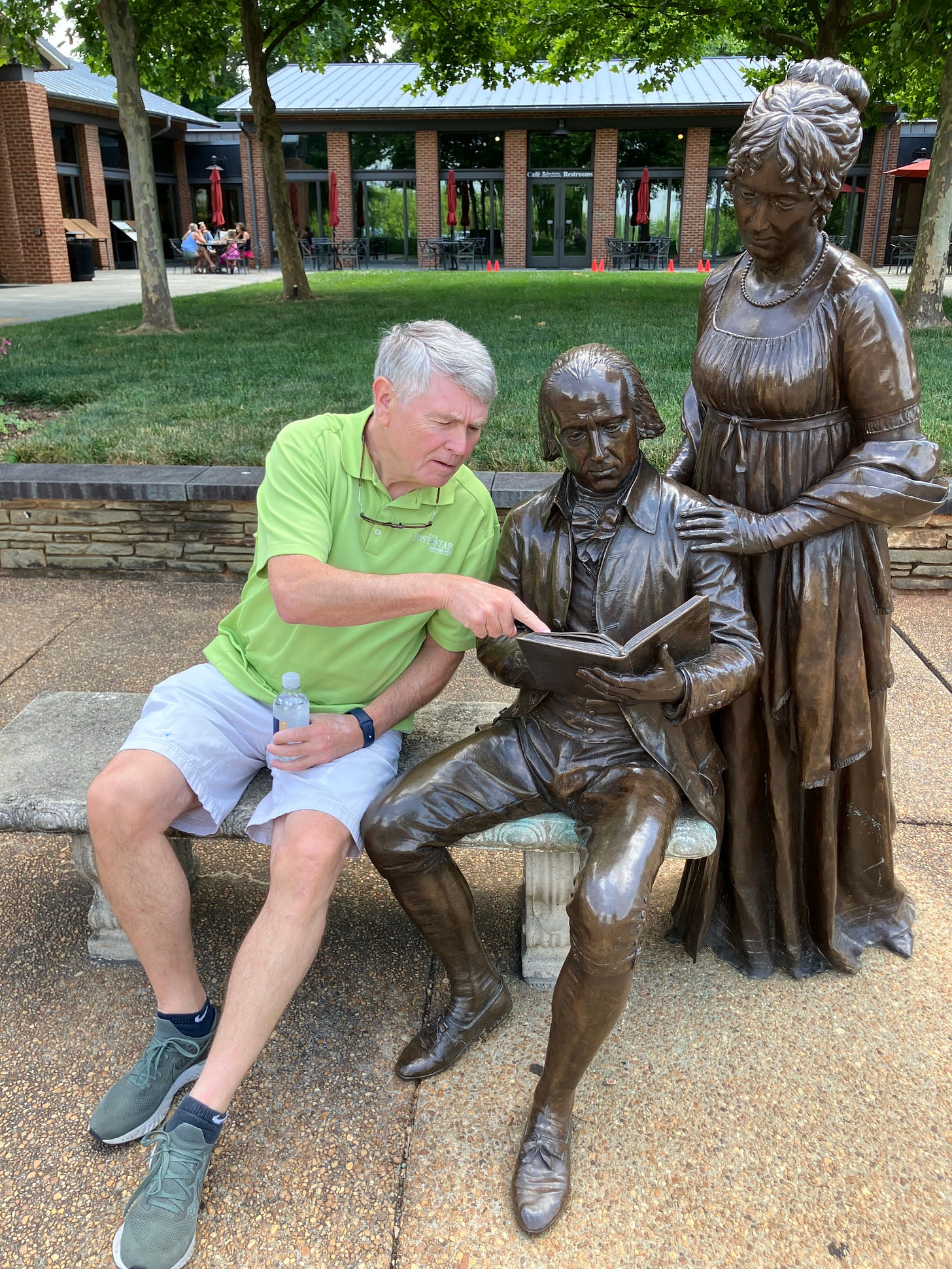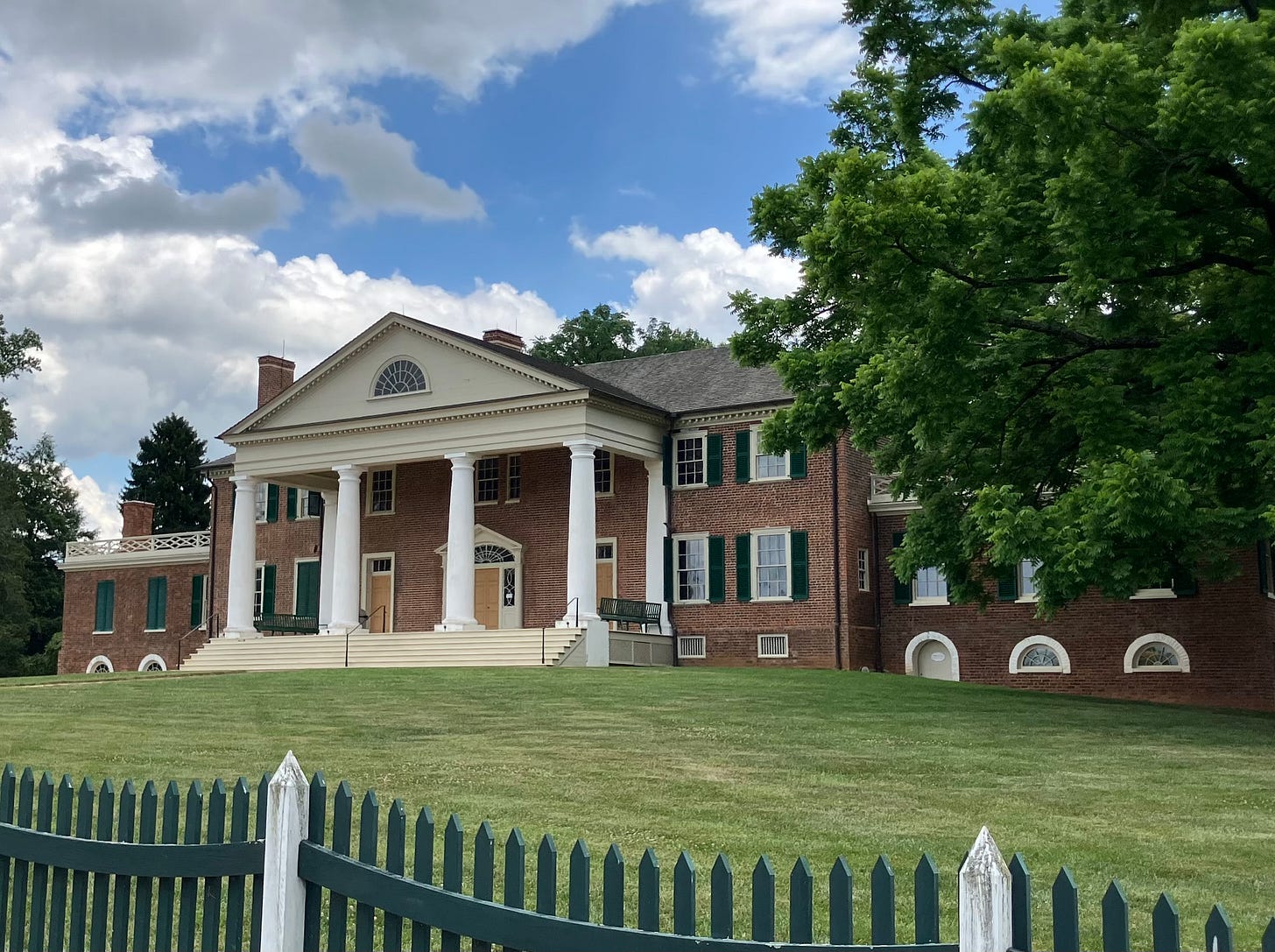Madison's genius may not be enough to preserve democracy
Stefanik touts over 1,700 public events: Has anyone been to one?
Please consider supporting The Front Page with a paid subscription: HERE
In typical American fashion, the message was scrawled on a T-shirt in the visitor center.
"If men were angels, no government would be necessary."
I'm sure James Madison never imagined the T-shirt.
Despite the medium, the message may be more important than ever.
Men are not angels.
Government is necessary.
Madison, the fourth president of the United States and the author of the Bill of Rights, wrote those words in Federalist 51 where he argued for the adoption of the proposed Constitution with a government protected by a series of checks and balances.
If you are not familiar with the Federalist Papers, you are probably not alone among the citizenry. The Federalist Papers are rarely mentioned on Facebook or Twitter.
They were a series of 85 anonymous essays published to support the adoption of the Constitution. Almost all were written by Madison or Alexander Hamilton.
Federalist 51 was published in 1788 under Madison's pseudonym "Pubilius," which in Latin means "the people" or "of the people."
Madison is better known for the First Amendment, perhaps the most important 45 words ever published in our country's history:
Congress shall make no law respecting an establishment of religion, or prohibiting the free exercise thereof; or abridging the freedom of speech, or of the press; or the right of the people peaceably to assemble, and to petition the Government for a redress of grievances.
That's a lot of power in 45 words.
A lot of genius.
So when we arrived at Montpelier - James Madison's home in Orange, Va. - there greeting us in bronze at the entrance to the visitor center was James Madison, seated on a bench, his wife Dolly, with a hand on his shoulder, and Madison in deep thought over his latest reading material.
I sat down next to the fourth president.
And as my son approached, I launched into a long overdue thank you for the First Amendment.
But my son had a better idea.
Right after my wife clicked the photo of the Madisons and me, Joseph jumped into the conversation and wanted to know if Madison could settle this quandary over what he really meant in the Second Amendment by a "well-regulated militia."
Judges are still trying to decipher the true meaning all these years later:
A well regulated Militia, being necessary to the security of a free State, the right of the people to keep and bear Arms, shall not be infringed.
An hour or so later, we were standing in the upstairs library where Madison probably did his best thinking and writing while looking out on the vast open lawn of Montpelier. This is why we make these journeys; this is why we want to know more about the Founding Fathers.
I first visited Montpelier in 1991 and it was a total disappointment. Subsequent owners of Montpelier had rendered the residence from Madison's time unrecognizable. When I returned with my brother a decade later, we passed up the house entirely. I told him it was not worth our time.
But between 2003 and 2008, the Montpellier Foundation spent some $40 million to return the house to what it looked like during Madison's time.
It turned the 55-room, 20th century mansion inhabited by the DuPont family back to the 22-room 1810 dwelling that was occupied by the Madisons.
It is a revival worthy of Madison's place in history.
It was a reminder of how important it is to tell these stories.
When I returned home, I kept thinking about the upstairs library at Montpelier where Madison did his writing; where he might have written Federalist 51 and invented a democracy to stand the test of time.
So I read Federalist 51 - a couple of times.
Madison was concerned the new country would retreat into a monarchy or authoritarian rule.
He was concerned that republics historically failed.
Instead, he suggested a country where the prevailing spirit called for justice.
But as it says on the T-shirt in the visitor's center, he had little faith in men being faithful to justice.
He realized those in the minority always got screwed by those in the majority and that was not justice. What I read from Federalist 51 - and I'm no expert - is that Madison wanted to dilute the majorities and the minorities so that the prevailing interest was justice. Perhaps, he envisioned a world where compromise was necessary.
Truth, justice, the American way.
What we accept today as the standard for freedom was a revolutionary concept at the time.
Madison writes that each "department" should have "a will of his own," but what we are seeing these days is little or no will to do the right thing.
"It is equally evident, that the members of each department should be as little dependent as possible on those of the others," Madison writes in 51 "Were the executive magistrate, or the judges, not independent of the legislature in this particular, their independence in every other would be merely nominal. But the great security against a gradual concentration of the several powers in the same department, consists in giving to those who administer each department the necessary constitutional means and personal motives to resist encroachments of the others."
Those encroachments are continuing as never before and this seems to be what Madison feared most.
Remember, men are not angels.
"The provision for defense must in this, as in all other cases, be made commensurate to the danger of attack," Madison writes in 51. "Ambition must be made to counteract ambition. The interest of the man must be connected with the constitutional rights of the place. It may be a reflection on human nature, that such devices should be necessary to control the abuses of government."
Those checks nearly failed during the Trump administration.
"But what is government itself, but the greatest of all reflections on human nature? If men were angels, no government would be necessary. If angels were to govern men, neither external nor internal controls on government would be necessary. In framing a government which is to be administered by men over men, the great difficulty lies in this: you must first enable the government to control the governed; and in the next place oblige it to control itself."
That was Madison's fear.
It is Madison’s worst nightmare.
Going international
A couple weeks ago, I got an email from a German journalist Jochen Dreier about doing an interview for a podcast on the state of American newspapers.
The podcast, "Der Riss," is a history podcast with the goal of shining light on historical events and trends. Dreier explained he was producing an episode about the history of U.S. media from the Civil War to the internet age and the decline of newspapers.
The podcast will be broadcast by ZDF, a German public-service television outlet that is run as an independent nonprofit. It sounds a like Germany's version of PBS.
My part had more to do with the decline of newspapers I described in my book The Last American Newspaper.
I've done a lot of interviews over the past three years about my books and the state of newspapers. It was clear Dreier had read the book which is not always the case when you are interviewed.
It was an enjoyable experience, and I got to ask a few questions of my own about the state of newspapers in Germany.
"Not good," Dreier replied.
I was sorry to hear that.
Chapman tour
The latest Chapman Museum walking tour is "Behind the Business" on Friday at 11 a.m.
This tour highlights some of the lesser known Glens Falls businesses on the west side of the downtown business district from the 1860s to the 1950s.
Participants can park at the Chapman Museum parking lot. Cost is $15 for non-members and $10 for members. Reservations are recommended by calling 518 793-2826.
Hope to see you there.
Stefanik events
On Rep. Elise Stefanik's website, it says she has held 1,733 local events. There is no context of what time frame it covers, but even if it is over the past 10 years that means she has held over 170 events a yer.
Yet, I cannot remember the last time I saw a Stefanik town hall advertised.
I cannot remember a local Stefanik event where the public was invited.
The congresswoman began to hold tele-town halls during the pandemic and continues to do so, but many believe the questions are cherry-picked to include questions that avoid the controversial issues of our time.
When I tried to sign up for one on her website this week, it said none were scheduled.
Rep. Stefanik does continue to post her votes on Facebook without context.
Here are some of the responses to votes on Facebook after she took credit for legislation that benefitted the North Country but which she voted against:
Ryan James
Its hilarious how Stefanik keeps trying to take credit for funding that the Biden administration is paying for and that she voted against haha...
And there you have it folks - a perfect example of another one of Trump's (spineless lapdogs doing all she can to push this BS in a desperate effort to save her own career - especially given Trump is now a convicted felon. All the BS about her supporting the American people, upholding the constitution, and upholding the rule of law is exactly that - BS - as it’s clear what her priorities are…
Tim Miller
One third of the population of NY-21 is below 185% of the poverty line, what are your Real Results (sic) for them?
Steven Fidelman
You voted AGAINST internet advances for the North Country. Fortunately, President Biden supported this for the North Country.
Joan Crounse
Which bill does this money come from and did you vote for or against the bill?
Please be specific.
You can find criticism on social media anywhere, but what is interesting about these is that they are on Elise Stefanik's Facebook page. There was no response to the criticism.
More ethics violations
At this point, Supreme Court Justice Clarence Thomas should announce his vacation plans to the public for this summer and who paid for them.
According to documents obtained by the Senate Judiciary Committee last week, Thomas failed to list three more trips that were paid for by others.
The trips included one to Montana near Glacier National Park in 2017, one to his hometown of Savannah, Georgia and a third to northern California in 2021.
At this point, you have to wonder if billionaire Harlan Crow has a second business as a travel agent where he gives away free trips.
How can any of this be acceptable to anyone in our country?
Ken Tingley spent more than four decades working in small community newspapers in upstate New York. Since retirement in 2020 he has written three books and is currently adapting his second book "The Last American Newspaper" into a play. He currently lives in Queensbury, N.Y.







The last time Stefanik had an in person Town Hall meeting in Plattsburgh, was in 2017.
https://www.northcountrypublicradio.org/news/story/33907/20170509/stefanik-faces-an-angry-emotional-crowd-at-plattsburgh-forum
You had to enter a lottery to be chosen to attend.
Imagine that in the US.
To have to win a lottery to be able to ask your Rep questions.
There were more people outside protesting then were able to meet with her.
She really is a coward.
She will not meet with the people she represents.
Tom Nichols on X described Trump loyalists, such as Bannon, Miller, Vance...as having "weird security issues" - he said that Stefanik has a different problem, "soulless opportunism". He got that right, for sure.